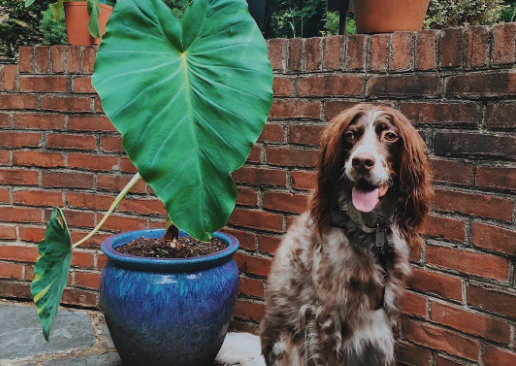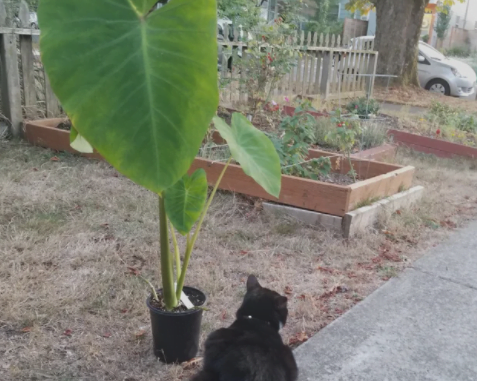Do you have a cat or a dog as a pet in your house, and they can't stop moving around sniffing and playing with things? What if your beloved pet fell ill because of chewing ornamental plants that you think beautify your home? And you have no idea about it! And if you are looking for elephant ear plant and pets relation, you have come to the right place.
Ornamental plants certainly beautify your home as they look lavish and provide a refreshing feeling throughout the day. But can you imagine that some of these beautiful indoor plants can be lethal for your dearest pup or a cat? I know you would never want to think about risking the life of your pet. For pets, the elephant ear plant is certainly not good.
One of the plants that are usually seen in homes for decorative purposes is the Elephant Ear plant. It is named so because of large heart-shaped leaves that mostly resemble the ear of an elephant. This plant is known as Colocasia esculenta and belongs to the family Araceae. Elephant ear plant and pet relation can be highly damaging for cats and dogs as it can be responsible for life-threatening conditions in them.
Contents
- Elephant Ear Poisonous for Dogs?
- Symptoms of sickness in Dogs
- Precautions
- Treatment
- First Aid
- Elephant Ear Poisonous for Cats?
- Symptoms of sickness in Cats
- Precautions
- Treatment
- What if a Cat Ate it?
- Other Animals
- FAQs
- Is It Poisonous For Pets?
- Is Elephant Bush toxic to pets?
- What happens if a dog eats an elephant ear plant?
- Will elephant ears kill cats?
- Is Elephant food plant poisonous to dogs?
- Conclusion
Elephant Ear Poisonous for Dogs?
The elephant ear plant contains calcium oxalate acid, which is insoluble in nature and is highly damaging as its crystals attach themselves to the tissues of the dog's mouth and skin and deeply penetrate it, causing intense pain. You will immediately notice the signs if your dog has Alocasia.
These signs include pawing at the mouth and on the face, foaming, and drooling. This is an alarming situation so take your dog to the vet as soon as possible. Your dog can also find it difficult to swallow and can breathe with difficulty because it constricts the air passageway. Its leaves and thorn can also give a toxic skin reaction and eye reaction to your dog.
Symptoms of sickness in Dogs
Major symptoms that are noticed in dogs with elephant plant poisoning are,

- Drooling
- Mouth pain
- Diarrhea
- Eye pain
- Nausea
- Lip swelling
- Sore throat
- Red eyes
- Vomiting
- Abdominal pain
- Difficulty in swallowing
- Lack of appetite
- Mouth ulcers
- Whining
- Watery eyes
- Difficulty in breathing
- Vomiting
- Sore throat
Precautions
The precautionary measure you can take to prevent this plant-based poisoning is to avoid putting this ornamental plant at your home or anywhere near the place where your pet can get it. If your dog has been poisoned, then take it to your vet so that he could take out all the further blood tests and urinalysis and give proper treatment to your dog to get the poison out.
Treatment
Once the physical examination is done and the vet gets to know the symptoms appearing in your dogs like temperature, abdominal palpitations, blood pressure, and heart rate, you need to provide your medical history to the vet as well and vaccinations done previously so that it will be helpful to diagnose your pet further.
Depending upon your dog's situation, it might be kept under observation for a night, and treatment will be given, which includes antihistamine, diphenhydramine. Sucralfate is given to dogs as well, which will help them through gastrointestinal irritation.
Once it is done, you can take your dog home but make sure to give him a proper diet for a few days as suggested by the vet because his stomach will be upset, and try not to keep elephant ear plants near the dog. Give your dog the proper medication as suggested and give him a separate place so that he can lay and get rest properly and recover faster.
First Aid
Now, what if your dog chews the plant mistakenly? Calcium oxalate, when taken in by a dog, causes intense pain to them; you can provide the first aid as soon as possible to decrease the pain from which your dog is going through.
First of all, make sure to rinse your dog's mouth again and again as it will decrease the inflammatory condition and flush the water multiple times. Give your dog some milk, cheese, or dairy product, as it will help in precipitating calcium oxalate crystals. If your dog is having diarrhea and vomiting, you will need to give water therapy.
As suggested by the vet, Antihistamine and anti-inflammatory should be provided to the dogs either through the mouth or intramuscularly. If you observe that your dog is not getting well through this treatment and it is becoming tough for him to breathe, try to take him to the vet as soon as possible so that his condition could be monitored quickly and irritation could be reduced.
Elephant Ear Poisonous for Cats?
The elephant ear plant is equally lethal to cats as it is to dogs. They are extremely sensitive to it as well; as soon as they come in contact with this plant, they will develop oral inflammation, diarrhea, lost appetite, mouth pain, dysphagia, just like that happens in the case of dogs.

Symptoms of sickness in Cats
Cats and dogs share common symptoms for elephant ear plants as well; the signs and symptoms are:
- Abdominal discomfort
- Nausea
- Vomiting
- Watery eyes
- Palpitations
- Oral pain
- Lethargic behavior
- Swelling
- Excessive drooling
Precautions
The precautionary measures you can take to protect your pet are simply by keeping your cats far away and distant from these plants. Try not to keep them in your house as well. And in case they come in contact, give them first aid or take them to the vet as soon as possible.
Treatment
Treatment that the vet will give you after the proper physical examination is antihistamines which will help in reducing the swelling on their mouth and the inside; it will also help decrease the inflammation down their air passageway so that they could breathe properly. They are given 0.25 mg of Sucralfate every 8 hours or depending upon abdominal discomfort and intestinal irritation your cat is having.
What if a Cat Ate it?
If your cat ate elephant ear plants, make sure to rinse his mouth well and take care of him properly. Provide him some peace and rest and give him first aid treatment at home as soon as possible, just as mentioned above. It will take 12 to 24 hours for him to recover, but if he doesn't, take him to the vet, get a proper checkup, and get the blood tests done to analyze the situation properly.
Other Animals
Elephant ear plants tend to cause toxicity to dogs, cats, and horses. Signs and symptoms are common in all of them except for vomiting, which isn't seen in horses. It causes extreme discomfort in these pets. Apart from this, there is little research regarding its toxic effect on fish, but it is not certain that either it is poisonous for them or not.
Other animals and pets are not affected by this plant as such. However, it is still better to use other ornamental plants at home if you keep any pet to keep them away from any bad situation.
Related Elephant Ear Guide: How & When to grow Elephant Ear plants
FAQs
Is It Poisonous For Pets?
Is Elephant Bush toxic to pets?
What happens if a dog eats an elephant ear plant?
Will elephant ears kill cats?
Is Elephant food plant poisonous to dogs?
Conclusion
If you have any pets at home and are looking for a relationship between elephant ear plant and pet, I am glad that you came across this article. Although the Elephant ear plant is wonderful and will instantly attract you, it has calcium oxalate in it, which is highly toxic for dogs and cats and can cause life-threatening situations in them. If you are having them now, try to get rid of them as soon as possible!. I hope you will find it very helpful if you have any pets at home. Keep your pets safe and stay happy!

